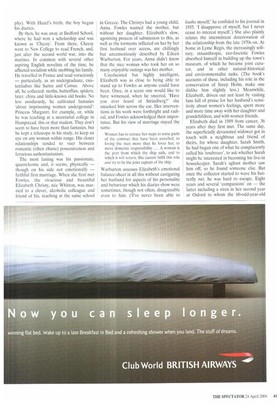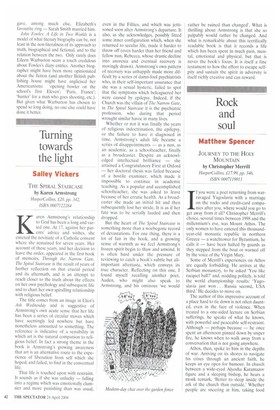A voracious collector
Jeremy Treglown
JOHN FOWLES: A LIFE IN Two WORLDS by Eileen Warburton Cape, £25, pp. 510, ISBN 0229059513 4 he only novelist now writing in
English whose works are likely
T
English whose works are likely to stand as literary classics . .. who has the power, range, knowledge, and wisdom of a Tolstoy or James.' Verdicts like this American one on John Fowles were a lot more common in the 1960s and 1970s than they have been since, and in the USA more than the UK. Fortunately, you don't have to agree with them to be absorbed by Eileen Warburton's well-written, thoroughly researched and even-handed biography — her first book, and evidently a labour, if not of love, then of the queasy fascination which will also be most readers' main response. 'The truth about any artist, however terrible, is better than silence,' Fowles — who authorised the book — once wrote, partly apropos of Thomas Hardy.
I don't see how the 'lies' we write and the 'lies' we live can or should be divided ... the kindest act to the [writer] is remembering them — and ... all art comes from a human being, not out of mysterious thin air.
Fair enough, except that Fowles simply wasn't Hardy. The usual excuse in such cases — nasty piece of work, but he produced such wonderful pieces of work — won't quite do.
For someone who never had the gift of seeing himself as others saw him, Fowles made a very good living out of seeing himself as he saw himself. When Warburton, then a graduate student in America, first met him, in 1974, he was at the height of his fame. His part-autobiographical fictions The Collector and The Magus were bestsellers and had been made into films, the first with Terence Stamp and Samantha Eggar, the second with Michael Caine, Anthony Quinn and Candice Bergen. The French Lieutenant's Woman had sold 100,000 copies within a week of publication in the USA, and stayed on the New York Times bestseller list for most of 1970. But Fowles hated the resulting loss of privacy. With the help of his volumi nously self-important diaries (Fowles claimed that it was his 'duty' as a novelist 'to have a profound love-affair with the complexity of his own mind'), John Fowles: A Life in Two Worlds uncovers an extreme version of the paradoxical relationship in romantic writing between solitude and self-exposure. The book also shows how much input (and output: she cut a huge amount) came from Fowles's wife Elizabeth — until he foolishly decided not to involve her in Daniel Martin. The role of professional editor-entrepreneurs, especially Tom Maschler at Cape, are another part of the story, as are the gaps between Fowles's intentions and how his books were read.
Fowles was born in 1926. Both sides of his family had briefly been well off, but the money had run out. Fowles's father, Robert, spent three years in Flanders, lost a brother at Ypres and never fully recovered his health. In much reduced circumstances, he and his wife set up home in Leigh-on-Sea, where Fowles grew up. He was an only child until the age of 15, when a sister, Hazel, was born: an unwelcome surprise to the rivalrous, intense adolescent, and one which affected him in ways at least as far-reaching as the more direct influence of several obsessions of his father's (gardening, for example, and, less expectedly, German Romantic poetry and American philoso phy). With Hazel's birth, the boy began his diaries.
By then, he was away at Bedford School, where he had won a scholarship and was known as 'Cheesy'. From there, Cheesy went to New College to read French, and, just after the second world war, into the marines. In common with several other aspiring English novelists of the time, he affected socialism while snobbing his family. He travelled in France and read voraciously — particularly, as an undergraduate, existentialists like Sartre and Camus. Above all, he collected: moths, butterflies, spiders; later, china and little-known old books. No less assiduously, he cultivated fantasies 'about imprisoning women underground': Princess Margaret, for example, or, while he was teaching at a secretarial college in Hampstead, this or that student. They don't seem to have been more than fantasies, but he kept a telescope in his study, to keep an eye on any woman within range. His closer relationships tended to veer between romantic (often chaste) possessiveness and ferocious authoritarianism.
The most lasting was his passionate, quarrelsome and, it seems, physically — though on his side not emotionally — faithful first marriage. When she first met Fowles, the vivacious and beautiful Elizabeth Christy, née Whitton, was married to a clever, alcoholic colleague and friend of his, teaching at the same school in Greece. The Christys had a young child, Anna. Fowles wanted the mother, but without her daughter. Elizabeth's slow, agonising process of submission to this, as well as the torments inflicted on her by her first husband over access, are chillingly but uncensoriously described by Eileen Warburton. For years. Anna didn't know that the nice woman who took her on so many enjoyable outings was her mother.
Uneducated but highly intelligent, Elizabeth was as close to being able to stand up to Fowles as anyone could have been. Once, in a scene one would like to have witnessed, when he sneered, 'Have you ever heard of Strindberg?' she smacked him across the ear. Her interventions in his work were forthright and radical, and Fowles acknowledged their importance. But his view of marriage stayed the same:
Woman has to retrace her steps to some parts of the contract that have been annulled, to loving the man more than he loves her, to more domestic responsibility .... A woman is the port from which the ship sails, and to which it will return. She cannot fulfil this role and try to be the joint captain of the ship.
Warburton assesses Elizabeth's emotional balance-sheet in all this without castigating her husband for aspects of his personality and behaviour which his diaries show were sometimes, though not often, disagreeable even to him. (I've never been able to
loathe myself,' he confided to his journal in 1955. 'I disapprove of myself, but I never cease to interest myself.') She also plainly relates the intermittent deterioration of the relationship from the late 1970s on. At home in Lyme Regis, the increasingly solitary, misanthropic, eco-fascistic Fowles absorbed himself in building up the town's museum, of which he became joint curator, and in other natural-historical and environmentalist tasks. (The book's accounts of these, including his role in the conservation of Steep Holm, make one dislike him slightly less.) Meanwhile, Elizabeth, driven out not least by visiting fans full of praise for her husband's sensitivity about women's feelings, spent more and more time away with her daughter and grandchildren, and with women friends.
Elizabeth died in 1989 from cancer, 36 years after they first met. The same day, the superficially devastated widower got in touch with a neighbour and friend of theirs, for whose daughter, Sarah Smith, he had begun one of what he complacently called his tendresses' , to ask whether Sarah might be interested in becoming his live-in housekeeper. Sarah's aghast mother saw him off, so he found someone else. But once the collector started to wave his butterfly net, he was hard to escape. Eight years and several 'companions' on — the latter including a siren in her second year at Oxford to whom the 60-odd-year-old gave. among much else, Elizabeth's favourite ring — Sarah Smith married him. John Fowles: A Life in Two Worlds is a model of what literary biography can be, not least in the non-literalness of its approach to truth, biographical and fictional, and to the relation between the two. Only rarely does Eileen Warburton seem a touch credulous about Fowles's diary entries. Another biographer might have been more opinionated about the fiction (and another British publishing house might have anglicised her Americanisms: 'opening bowler on the school's first Eleven.; 'Paris. France': 'hunter' for a man who goes shooting, etc.). But given what Warburton has chosen to spend so long doing, no one else could have done it better.




















































































 Previous page
Previous page